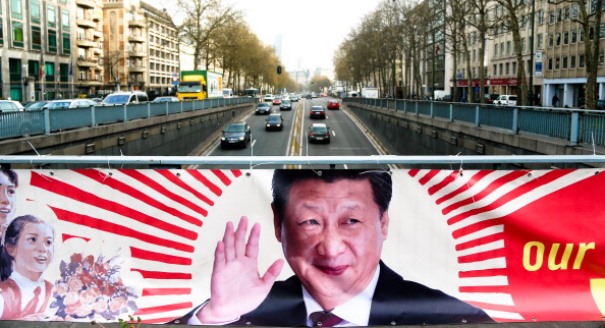On March 31, Chinese President Xi Jinping visited Brussels for the first time since being elected to the presidency in 2012. Shi Zhiqin, a resident scholar at the Carnegie-Tsinghua Center for Global Policy, assesses how Beijing views EU-China relations and considers what the future might hold.
- What is China’s perception of Europe?
- How much importance does Beijing attach to the EU versus its member states?
- How has China positioned itself in the Ukraine crisis?
- Is there a role for the EU in China beyond trade and economics?
- How does Beijing see the future of EU-China relations?
What is China’s perception of Europe?
In its quest for a multipolar world order, China looks to the EU as one of the most important actors in a balanced geopolitical structure. At a press conference after last November’s EU-China summit, Chinese Premier Li Keqiang labeled Europe an “important pole” in a multipolar world and an “important partner” in China’s path to modernity. Yet China also understands that the EU’s decisionmaking model sometimes hinders its ability to act as a unitary actor in international affairs.At the same time, China recognizes cases of European “political mismanagement” such as the eurozone crisis that present obstacles to integration and fuel Euroskepticism. The EU can only overcome such obstacles through fair and inclusive political and institutional solutions. The European Stability Mechanism, banking union, and fiscal federalism are all necessary instruments for a united and influential Europe.
In the meantime, China has offered a helping hand by promoting investment in the EU’s periphery in an effort to support the euro and stabilize the EU’s economy. Xi’s visit has secured multibillion-dollar trade agreements with France, Germany, and the Netherlands on a range of goods.
How much importance does Beijing attach to the EU versus its member states?
Chinese leaders and diplomats have spent great time and effort in an attempt to understand the EU’s decisionmaking mechanisms. In the past five years, Beijing has increasingly sought to negotiate substantive issues at the EU level by engaging directly with the Brussels-based institutions.
At the same time, China has also engaged with the member states—out of necessity rather than choice, as they still enjoy significant sovereignty. Contrary to some media reports, there is no Chinese strategy to “divide and rule,” for the simple reason that such behavior would undermine Sino-EU relations in the long term.
How has China positioned itself in the Ukraine crisis?
China has long argued for respect for national sovereignty, autonomy, and the peaceful resolution of disputes. In that sense, Beijing does not support coercive diplomacy against Russia and seeks a negotiated resolution of a crisis that has to a certain extent been facilitated by the intervention of many foreign actors in Ukrainian politics.
China also recognizes the historic significance of what is at stake. While EU integration is important for Ukraine, the West should also take into account Russia’s sensitivities about the birthplace of its civilization.
Of course, Russia should be careful not to respond disproportionately to the Ukraine crisis. As Russia is a nuclear power that plays a major role in providing resource stability, conflict with the West could destabilize the global economy at a time of fragile postcrisis recovery. China therefore wishes to see more dialogue and cooperation between the EU and Russia and hopes for a peaceful resolution to the Ukraine crisis.
Is there a role for the EU in China beyond trade and economics?
Definitely. China’s engagement with the EU is built on a strong and unshakable partnership that could offer a broader template for great power relations.
The EU is China’s largest trading partner but also a “development partner.” Chinese leaders acknowledge this by looking to the EU as a model for urbanization and sustainable development. Aside from economics, the two sides have comprehensive people-to-people contacts and cooperate on peace and security issues. The EU has welcomed China’s contribution to antipiracy operations in the Horn of Africa and its support for EU foreign policy chief Catherine Ashton on negotiations on Iran’s nuclear program.
China and the EU also engage in judicial exchanges, and Beijing believes that the EU’s legal system offers a good model for its own legal reforms.
How does Beijing see the future of EU-China relations?
For the EU-China partnership to become deeper and stronger, a stable and prosperous eurozone is essential. A eurobond market would allow China to diversify its foreign exchange reserves away from U.S. treasury bills. Such a move, if accompanied by a more liberal Chinese currency regime, would limit America’s ability to run large budget deficits and maintain a high level of defense spending.
In the longer term, that would lead to less U.S. unilateralism, which would also benefit Europe. In his 2013 State of the Union speech, European Commission President José Manuel Barroso cited the United States as the source of the global economic crisis. If the euro made up a larger share of world commerce and central-bank transactions, the EU could become more assertive in demanding its own reforms to the global monetary system.
It is important for both China and the EU to use the momentum of Xi’s visit to neutralize misperceptions and take the responsibility that their size demands for resolving global issues. Of course, for such ambitious cooperation to take place, the EU must also resolve its internal political crisis. The Chinese remain fervent supporters of Europe’s “political fermentation” and hope to soon taste its exquisite “political wine.”





.jpg)
.jpg)

